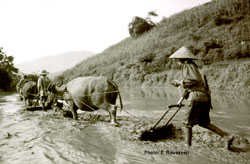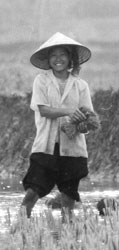SAM - Regional > Introduction

In a context of fragile ecosystems and the precarious living conditions of mountain populations the “Regional” component of the SAM Program aims at:
- Understanding
and modeling at different spatial and time scales the mechanisms of
agricultural transformations at the interface between societies and
their natural environment. Assessing agro-ecological and socio-economic
viability of slash-and-burn agricultural practices in northern Vietnam
uplands.
- Proposing
technical and organizational alternatives for sustainable agricultural
production systems, from plot to small rural areas, with a particular
emphasis at the farm level and interventions targeted at village communities.
- Extending
to large geographic areas locally designed and tested innovations. It
is thus necessary: (i) to develop methods to extrapolate locally specific
research results and (ii) to provide decision aid tools to be used by
a large range of actors of agricultural development and natural resources
management, from farmers to agricultural services and policy makers.
Our research is explicitly oriented towards regional development, with a strong emphasize on methodological development to make sure the results can be generalized to other situations.
Hypotheses
In the context of Vietnam agriculture, our research approach is based on the following hypotheses:
- Slash and burn
cropping systems are no longer viable in the current context of high
population pressure and advanced degradation of the forest cover,
- Further expansion
of these non-sustainable practices will result in environmental degradations
locally affecting other agricultural activities and rural development
in general.
- Alternatives
to these cropping systems exist. However, their diffusion does not only
rely on their intrinsic qualities and technical efficiency, but also
to a large extent on the organizational aspects at farm level and the
institutional context at the village community and higher hierarchical
levels.
Methodological constraints
Our research program faced methodological constraints specific to the history and geography of Vietnam.

The rapid pace of change. The very rapid pace of change in the region, especially since the privatization of the economy, land redistribution, and political reforms of the late 1980’s profoundly modified the relations between people and their environment and also the interactions between stakeholders concerning their environment. In this context of rapid changes, research results may be obsolete and/or useless before they can be released, if methodologies can not adapt continuously to this very dynamic environment. Keeping pace with the rapid agro-ecological and socio-economic changes is thus a major challenge of research programs in order to maintain their relevance to development issues.
An extreme diversity of natural and human environments. The extreme diversity, both ecological and social, is a major constraint to the generalization of local studies to higher integration levels. The main development trends are expressed in many different ways at farm or village level depending on local circumstances. This high diversity creates a very complex picture where there is no typical district, village or even household. This high heterogeneity raises major methodological problems for sampling procedures, data collection, and extrapolation of locally obtained results.
Methodological choices
Three main principles guided our research approach:
Systems approach and interdisciplinarity. The SAM-Regional program analyses land use change dynamics at the interface between biophysical and socio-economic transformations. This requires integrating the different aspects of a complex reality, which makes a systems approach very relevant. The interest in regional level dynamics leads to the involvement of scientific disciplines beyond traditional agronomy such as ecology, soil science, climate science, economy, sociology, geography, etc. Systems approach is a common ground that facilitates the interactions within our interdisciplinary research team.
Multi-scale characterization of land use changes, using
- Satellite image
and aerial photograph interpretation;
- Integration
of biophysical and socioeconomic data through GIS techniques;
- Multi-agents simulation (MAS) tools to understand the main driving forces of observed land use changes. A people-centered model reproduces the functioning of a village agro-ecosystem and especially the interactions between agricultural production and natural resource management. Then, we combined the SAMBA role-play, derived from the computer model, with rapid appraisal methods to generalize the participatory diagnosis up to the regional scale.
Continuum research – development – policy, through an active contribution of the end-users of the research results (farmers, extension agents, local and regional decision-makers) in the research process.
| Time frame | ||
| Viability assessment | ||
| Monographic
studies |
||
| Multi-scale
GIS |
||
| Methodology
integration |
||
| Driving
forces for changes |
||
| Accessibility
studies |
||
| Land
allocation |
||
| Crop-livestock-forest
systems |
||
| Scale
transfer |
||
| Analyzing
innovation process |
||
| Accompanying
changes |
||
| Communication platform | ||
Capacity building
Between 1998 and 2002, the SAM-Regional Program contributed to training through research as follows:
- Training of
project staff members: supervision of 3 M.Sc. and 2 Ph.D. thesis implemented
in the framework of the project, and advisory role for 3 M.Sc. and 2
Ph.D. done abroad,
- Supervision
of 6 trainees from Thai Nguyen Agroforestry College for their B.Sc.,
- Supervision
of 6 foreign M.Sc. students (French and Dutch) who contributed to the
SAM-Regional Program: CNEARC, INA-PG, Wageningen University.
- Contribution to international training organized by ICRAF (Vietnam agroforestry capacity building), IRRI (Training on upland rice ecosystems, modeling methods as part of the Ecoregional Initiative capacity building activities), etc.